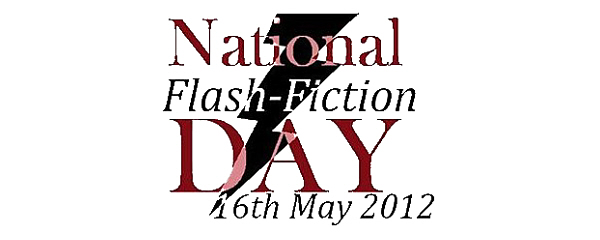
by Pauline Masurel
Wednesday 16th May has been declared National Flash-Fiction Day (NFFD) in the United Kingdom. Who decides these things? Well, in the case of NFFD it’s their Director, Calum Kerr, a man so steeped in flash writing that he produces a tiny story every day, which you can read at his blog, flash365.
When I asked him why he thought that flash fiction needed a day of its own he replied, “Because I was writing a lot of flash, meeting people – in real life and online – who wrote a lot of it, but when I looked, there wasn’t a day. I put forward the idea and the result was a resounding ‘Yes’ followed by an even more resounding ‘You’ll be doing it then?'” It seems that he couldn’t resist taking the bait. There was already a National Short Story Day in December and a National Poetry Day in October, so 16th May was picked to be somewhere approximately midway between the two.
Since then, he says that the project has “been forging a new community of writers, bringing together disparate groups and individuals under the banner of ‘flash-fiction’. At the same time it’s raising the profile of the form and bringing it to the public’s attention. It’s very rewarding.” Many of these other flash fiction writers and proponents of the form are also supporting the national day.
It’s still not unusual to hear people ask what flash fiction is and the NFFD website is well-prepared with the answer to the Flash-what? question. Everyone seems to agree that no one knows how long (or short) a flash fiction must be, with word limits ranging from around a thousand words at the upper end, down to anything under 25 at the lower. Mathew Ferguson has written hundreds of two-sentence stories. A book of twenty-five-word ‘hint fiction’ was published last year. Story Bytes is a website featuring stories which are exactly the length of a power of two, including quite a number of two-word stories. But perhaps something in the range 100-600 words would be more typical of what most people think of as flash fiction.
Nor is anyone quite sure when the term was coined. In 1992 an anthology called ‘Flash Fiction: 72 Very Short Stories’ was published, taking over from the term ‘Sudden Fiction’ used to describe micro-stories in a 1987 anthology. This was possibly the first use of ‘flash fiction’ but was certainly not the advent of tiny stories themselves. Not everyone likes the description, though; some use the term micro-stories – Nik Perring prefers to call them short short stories, while I’m rather fond of tiny stories. But whether its writers like it or not, the name flash fiction appears to have caught on.
So now that flash fiction has its own national day, how should we all be celebrating it? I put this question to Calum Kerr and he replied, “By doing something flash-y. Everything from hosting or attending an event down to just writing a flash-fiction in honour of the day. I don’t mind what it is, I just like the idea that it will be National Flash-Fiction Day and people will be doing something to mark it.” A new anthology of flash fictions will be published on the day itself and a number of special events will be taking place around the country. So if there’s one near you, do consider going along to see what all the fuss is about. Alternatively, stay home and write your own flash fctions.
Personally, I’m rather torn about exactly how to celebrate the day myself, because it’s also my wedding anniversary, but Calum Kerr already has a busy program for his own NFFD. He will be hosting a ‘Write-In’ at Winchester University, where he teaches. This event will also be open to writers worldwide since the writing prompts will be made available online at the Write-In blog. Those participating online can email their resulting flash fictions to the site and have them added to the blog. In the evening, Calum will be holding the main launch event for National Flash-Fiction Day and the new anthology at Southampton City Library, where he will be joined by Vanessa Gebbie, Holly Howitt, Sara Crowley and others. He says, “It promises to be a really great evening. It’s free too!”
*
In two THRESHOLDS articles earlier this year, It Takes Longer To Write Than To Read and Little Fictions, Big Questions, Nik Perring and Ursula Hurley also wrote about the joys of flash fiction.
*
EDITOR’S NOTE: In preparation for FLASH FICTION DAY on 16th May, we are inviting readers to send us their Tweet-length short stories. The best of these will be published on the day, alongside contributions from a number of well-known Flash writers. If you’re not already following us on Twitter, please do check us out by clicking on the Twitter icon on our home page. Tweet us at @ShortStoryForum, and show us your FLASH!


Thanks Loree, that’s a challenge. I will give it a go!
I sent my Flash story off to Flashfloods last night, luckily they liked it and say they want more people to submit. Thanks Pauline. How long’s a Tweet, Loree?
Hi Amanda, great to hear about the Flashfloods, piece. A Tweet is 140 characters, including the spaces, though with the @ShortStoryForum, that reduces it to a mere 124 characters. So slightly longer than the 6-word short stories that The Guardian did a few years ago, but not by much!
So if you send them to the email address, you have the advantage of an extra 14 characters… : )
In case you didn’t realise, we are currently running a Twitter campaign, asking for Tweet-length stories. The best of these will be included in our special Flash Fiction Day feature, next Wednesday. So if you’re interested, send your Twitter stories to us care of @ShortStoryForum. Or, alternatively, if you aren’t on Twitter, you can send them direct to me at: thresholds@chi.ac.uk.
There will also be an opportunity for people to send in longer pieces of flash fiction, next Wednesday, via the comment facility.
Thanks Pauline. I think I will send a little story over to flashflood tonight. I like the sound of Tania Hershman’s collection. What a great title!
Wow, such a lot going on! Thanks Pauline. I’ve only just started writing Flash on purpose, if you know what I mean, partly because I’ve realised how good they are to read. It is amazing what some writers can do and how they play with your mind. The Flashpoints blog http://nffdflashpoints.blogspot.co.uk/ are showing site specific work – you leave your story where you wrote it – probably not at home, building up to NFFD. I find that a lot of fun. You photograph the piece it in situe. I left mine in bluebell wood and when I took my dogs there a few days later it had disappeared. I don’t know if it has been picked up by the litter conscious or eaten.
I wonder if anyone can go to the Southampton event or if it’s by invitation.
I hope you manage to combine your wedding anniversary with some flash.
Amanda, what a wonderful project. Already I’m feeling the urge to write a tiny story on a bookmark and leave it in a bookshop.
If anyone is finding it too damp underfoot to go tramping through the woods to infiltrate their flash fiction into the eco-system then there is also an online flash flood you can contribute to at http://flashfloodjournal.blogspot.co.uk/
I also enjoy reading flash fiction as well as reading it. I’m currently reading Tania Hershman’s marvellous collection, ‘My Mother Was An Upright Piano’. And Jon McGregor’s latest collection, ‘This Isn’t The Sort Of Thing That Happens To Someone Like You’, at the moment. Although some of his stories are longer there are many wonderful flash fictions included and since most are set in the fenlands of Lincolnshire, there’s a fair bit of flatness and flood too.